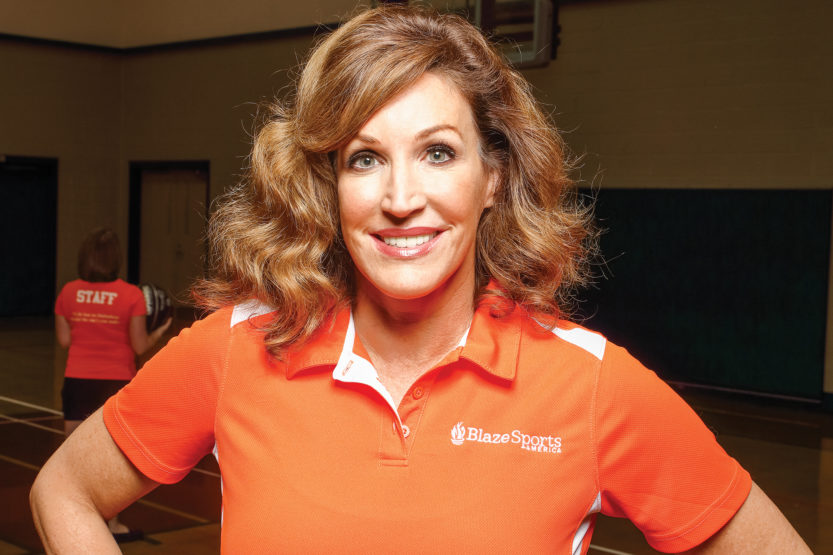Alumni Interview: Cynthia Frisina
 “I’ve seen the power of sports,” says Cynthia Frisina, ’85 LAS. “It’s transformative. It really does change lives.”(Image by Matt Odom)
“I’ve seen the power of sports,” says Cynthia Frisina, ’85 LAS. “It’s transformative. It really does change lives.”(Image by Matt Odom) I change people’s lives. I feel really grateful to be able to do that.
I’m the executive director of BlazeSports America, a nonprofit organization that helps individuals with physical disabilities through adaptive sports. I’m also co-founder of Reaching for the Stars: A Foundation of Hope for Children with Cerebral Palsy, a research and support group related to cerebral palsy, a neurological disorder that is the most common motor disability in children.
After graduating from Illinois, I went into advertising and marketing in Chicago, then moved to Atlanta to work for BellSouth Corp., which is now AT&T. In 2000, my second daughter, Cathryn, was born. When she was diagnosed with cerebral palsy in 2002, I couldn’t believe there wasn’t a national research or parent organization for a condition that affects almost 1 million people in the U.S. and 17 million worldwide. With my marketing background, I thought I could do something about it. I started Reaching for the Stars with another mother. We thought it would be a small nonprofit effort. But because there wasn’t anything like it, Reaching for the Stars grew rapidly. Next thing I knew, I was traveling around the world, speaking about being a parent with a child who had cerebral palsy. I found myself in Washington, D.C., testifying before Congress about the need for research on pediatric brain issues.
As Cathryn got older, she wanted to play sports like her sister, Alexandra, who is two years older and a great athlete. But if you have a disability, your opportunity to participate in athletics is limited. I searched and found BlazeSports America, an organization that specializes in adaptive sports programs. Cathryn fell in love with that, and I saw how it changed her demeanor. Long story short: I joined the board and became executive director.
The University of Illinois is probably the elite university in the country for Paralympic training. I’m proud to be associated with a university that has made such a commitment.
BlazeSports America is the legacy organization of the 1996 Paralympic Games in Atlanta. This year is our 20th anniversary, as well as a Paralympics year. We train adaptive sports leaders across the nation and operate in 11 countries. In 2009, we started serving military veterans.
Our headquarters is a big warehouse filled with sports equipment. We do programs all over, in different local parks and facilities. We go out where the kids and veterans are. We have a fleet of vehicles to transport our athletes. We help fund their travel to take part in competitions.
Here in Georgia, we do direct programming for a range of sports, from golf to rock climbing. Nationally, we do training and education. We partner with universities and other adaptive sports organizations. Internationally, we have in-country partners that do sports festivals and train service providers to bring adaptive sports to their communities.
For me, there’s not really a typical day. I could be at one of our programs, speaking at an event or working in another country. Fundraising is our biggest hurdle. Probably 30 percent of my time is spent fundraising—sponsorships, donations from individuals, grant writing.
Cathryn is now 15, and she is a straight-A student who is on a national track and field team, and has the goal of becoming a Paralympian. She thinks of herself as an athlete. Before Cathryn got involved in sports, she felt like she didn’t fit in. I’ve seen the power of sports, how it changes the self-image of these kids, and gets them physically fit. It’s transformative. It really does change lives. Not just the kids and veterans, but their families. It’s hard to put into words the satisfaction that I get seeing the joy these kids have and the joy their parents have watching them compete or learn a new skill.
The University of Illinois is probably the elite university in the country for Paralympic training. I’m proud to be associated with a university that has made such a commitment. Illinois gave me opportunities and set me on my course to business success.
In light of the adversity and challenges that people with disabilities face, you might think there would be sad attitudes or negativity. But I’ve never been around a more positive group of people in my life. It’s hard to have a bad day. It’s a privilege and an honor to be in this role.

